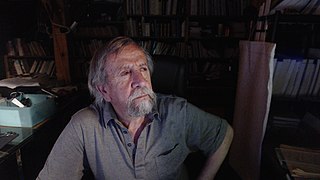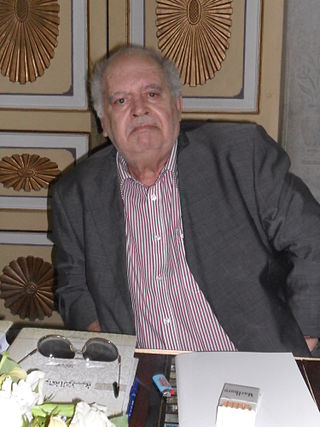
Islam in France is a minority faith. Muslims are estimated to represent around 4% of the nation's population as per Statista and Le Monde, although Insee claims that in metropolitan France this percentage can reach 10%. After conquering much of the Iberian peninsula, the Umayyad Muslim forces invaded modern day southern France, but were defeated by the Frankish Christian army led by Charles Martel at the Battle of Tours in 732 AD, thus preventing the possible Islamisation of Western Europe. During a later incursion, Muslims established the fortress Fraxinetum. France's Muslim population grew starting in the second half of the 20th century, following immigration from former French colonies and protectorates in Africa and the Middle East.

Mohammed Arkoun was an Algerian scholar and thinker. He was considered to have been one of the most influential secular scholars in Islamic studies contributing to contemporary intellectual Islamic reform. In a career of more than 30 years, he had been a critic of the tensions embedded in his field of study, advocating Islamic modernism, secularism, and humanism. During his academic career, he wrote his numerous books mostly in French, and occasionally in English and Arabic.

Claude Cahen was a 20th-century French Marxist orientalist and historian. He specialized in the studies of the Islamic Middle Ages, Muslim sources about the Crusades, and social history of the medieval Islamic society.

Islam is the most widespread religion in Bosnia and Herzegovina. It was introduced to the local population in the 15th and 16th centuries as a result of the Ottoman conquest of Bosnia and Herzegovina.

Sami Awad Aldeeb Abu-Sahlieh is a Swiss Palestinian lawyer.

The Grand Mosque of Paris, also known as the Great Mosque of Paris or simply the Paris Mosque, is located in the 5th arrondissement and is one of the largest mosques in France. There are prayer rooms, an outdoor garden, a small library, a gift shop, along with a cafe and restaurant. In all, the mosque plays an important role in promoting the visibility of Islam and Muslims in France. It is the oldest mosque in Metropolitan France.

Malek Bennabi was an Algerian writer and philosopher, who wrote about human society, particularly Muslim society with a focus on the reasons behind the fall of Muslim civilization. According to Malek Bennabi, the lack of new ideas in Islamic thought emerged what he coined civilizational bankruptcy. He argued that in order to recover its former magnificence, Islamic society had to become an environment in which individuals felt empowered. In order to satisfy his spiritual and material needs, a Muslim needed to feel that his industry and creativity would find reward.

Youakim Moubarac was a Lebanese French scholar. He was an Islamologist, an Arabist and a disciple of the Orientalist Louis Massignon and of philosopher Louis Gardet. A Maronite priest, Moubarac dedicated his life and major works to interfaith dialogue between Christianity and Islam, to Arab and Lebanese causes, to the unity of the Church and to the Maronite Church Antiochian heritage.

Abdelwahab Meddeb was a French-language writer and cultural critic, and a professor of comparative literature at the University of Paris X-Nanterre.
Jacqueline Chabbi is a historian and a professor of Arab Studies at the University of Paris-VIII. Her research concerns the history of the medieval Muslim world.

Charles Pellat was a French Algerian academic, historian, translator, and scholar of Oriental studies, specialized in Arab studies and Islamic studies. He was an editor of the Encyclopaedia of Islam published by Brill Academic Publishers, and a member of the Académie des Inscriptions et Belles-Lettres.

Malek Chebel was a notable Algerian philosopher and anthropologist of religions. He was one of the most prominent North African intellectuals. He studied in Algeria, then later in France at Paris where he also studied psychoanalysis. He was a teacher at many universities worldwide.

Hichem Djait, also known as Hichem Jaiet, was a prominent historian and scholar of Islam.
Georges-Henri Bousquet was a 20th-century French jurist, economist and Islamologist. He was a professor of law at the Faculty of Law of the University of Algiers where he was a specialist in the sociology of North Africa. He is also known for his translation work of the great Muslim authors, Al-Ghazali, a theologian who died in 1111 and Tunisian historian Ibn Khaldun (1332–1406). He was known as a polyglot, spoke several European languages and Eastern ones.
Geneviève Gobillot is a French scholar of Islam, Muslim civilization professor at the Jean Moulin University Lyon 3 since 1993, a specialist in Islamic mysticism, Shi'ism and Sufism, particularly in Al-Hakim al-Tirmidhi, author of the 10th century. Her work also includes the intercultural and intertextual reading of the Qur'an in the context of a rapprochement between monotheisms.

André Miquel was a French Arabist and historian, specialist of Arabic literature and Arabic language.

Dominique Hélène Bouzar, better known as Dounia Bouzar, is a French anthropologist, writer and educator who has worked towards better acceptance of Muslims, especially Muslim women, in France. She has held high-level posts where she has contributed to promoting the understanding of Muslims but has not always seen eye to eye with the authorities.
Jocelyne Dakhlia is a French historian and anthropologist. A director of studies at the École des hautes études en sciences sociales, her work is concerned principally with the political and cultural history of Islam in the Maghreb countries bordering the Mediterranean Sea.
The Collective Against Islamophobia in France was a French non-profit organisation, created in 2003 and dissolved in 2020, which mission was to combat discriminations towards Muslims in France, providing legal support to victims of such discriminations. It annually reported acts it considered Islamophobic. The organisation received critics, about its use of the term Islamophobia, and suspicion of having Islamist links.
Jocelyne Cesari is a French political scientist and Islamic studies scholar who is tenured at the French National Center for Scientific Research in Paris. Her works focus on religion and international relations, Islam and globalization, Islam and secularism, immigration, and religious pluralism.














